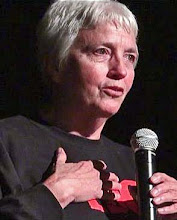Not into the water, but into a conversation with a bright 8-year-old girl, and I was really perplexed as to what to say next. Falling into the slimy water would have been easier.
We had been bird watching, respectfully "stalking" a sand hill crane couple and their 2 newborns. They were pecking their way from this scenic pond on the edge of the motel--the unofficial homeless shelter not far from the land of Mickey Mouse and friends. Since the area has no shelter, homeless families, if they can scrape together $200 or so a week, will shove their stuff in storage and squeeze into these boxy ill-equipped rooms, or into the even scuzzier and smaller rooms in the scads of struggling motels lining the highway.
"Mandy" and her mom and dad (note: 2 parents) have a tiny room on the first floor. Not a suite. A room. And to make ends meet, they've creatively and desperately decided to rent to "Chad," a disabled Viet Nam Navy vet who is happy for the "cheap" place to stay. Yeah, renting a room to a stranger when you've lost your place to live (Hurricane Katrina, Nashville floods, and foreclosure, the trifecta) is desperate.
So Mandy and I were gazing at the ducks, otter, turtles, and other critters and talking about the 2 little crane chicks. The conversation went something like this:
"Where do the birds live?"
Somewhere along the edge of the pond (I'm assuming loons and cranes might be similar, but I'm sure they're not, beside the point to an 8-year-old who's fortunately not a loon/crane expert.)
"What do they eat?"
They peck at little bugs in the grass, on the shore, and in the water near the edge.
"What if an alligator came along?" (in that inimitable tone of an 8-yo)
The parents would protect them. (me slipping, teetering...)
"How would they fight a big alligator?" (She astutely figured no way, Jose.) Splash.
Other birds would help. (Right.) Then I did the adult thing and changed the subject.
I pictured Mandy's stressed-out mom and dad fighting the alligator (predators abound in their lives, today it was the IRS that absconded with dad's tax refund to pay a student loan debt). I sure as hell knew that other than some of the ill-equipped families staying at the motel who would come out swinging flimsy sticks, no help was going to fight off the gator and rescue the chicks and the parents.Mandy's family must come up with $200 a week to stay here. They've decided Chad is a mistake, but for now he's part of the equation. Both parents work in food service, a flagging industry at best, with irregular hours and skimpy tips. They pass the care of Mandy off like a baton in a race for survival, trying to maintain the confidence of parents that have it all under control. They snatch extra work hours if asked, to the point of exhaustion.
But the gators are circling. Their car needs expensive brake repairs. The IRS has honed into their bank accounts, squeezing blood from the turnips. Mandy wonders why they never have gone to Disney World, giving both parents guilt complexes that have them figuring out how to compensate their daughter for her lost childhood. Tensions abound--between the family and the interloper and between parents deprived of intimacy and peace of mind, however fleeting. Insurance? Nope. Safety net of family or friends? Nope.
Because this family has paid for the room themselves, they're not considered "homeless" by the bureaucracy that could offer (theoretically at least) housing assistance through HUD. This seemingly insignificant glitch is huge on several levels. Congress begrudgingly allocates chump change to what they think is the "manageable" homeless problem as reported by HUD--a "mere" 630,000 bedraggled men and women. Imagine them calling their congressman (something I encourage desperate homeless persons to do) and trying to explain they're homeless but not really homeless by HUD's standard. Confusing at the least. Damning is more like it.
Families in motels like Mandy's abound, not just in Mouseland but nationwide. They're gator bait. Nobody knows they're there. They're not counted by HUD as homeless. Congress is clueless. And those "advocacy" groups working against us are, well, gators hiding in the weeds.
We're trying to help. HR 32, the Homeless Children and Youth Act, would change the way HUD defines (and eventually helps) homeless families and youth. But it's gotta pass first. Here's more about it and a simple way to get your congressperson on board.

In the meantime, come down with me and grab a big stick. This is a fight worth fighting even if our opponents have sharp teeth and lethal tails.
Picture telling Mandy that she, her parents, and scores like them are doomed.
In a adaptation of Mollie Ivins, one of my favorite hell-raising s-heroes' techniques, banging on pots and pans, let's grab pitchforks, baseball bats and brooms and beat these alligators in every way we can to save the vulnerable chicks.Then fish me out of the pond, will ya?











